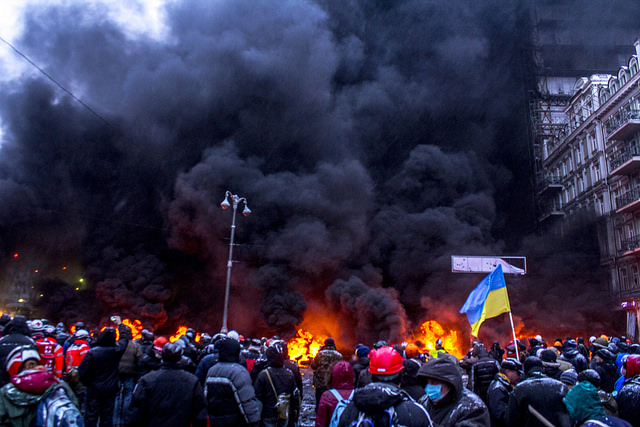“Yats is the guy …” high-ranking American State Department official Victoria Nuland explained on the phone to the U.S. Ambassador to Ukraine. Their conversation was made available on the Internet by Russia, and got wide attention mainly because Nuland also said: “F..k the EU.”
A former central banker ready to apply austerity policies to his country, Arseniy “Yats” Yatsenyuk is now the interim Prime Minister of Ukraine, until the May 25 elections are held. Former President Viktor Yanukovych fled the country, and was deposed by parliament late in February.
Ukraine cannot just be Ukraine: it’s an object of great power meddling. With massed citizen actions calling for change, the Americans wanted to shape the new government, bypassing the European Union. Yats got his job.
The recent insurrection had its origins in pro-European students protesting in the Maidan Square in Kiev (Kyiv in Ukrainian), and grew when government security forces shot and killed protesters. The situation deteriorated rapidly as various militarized factions began intervening in massive peaceful demonstrations, with unidentified sharpshooters killing Maidan activists.
After Yanukovych was deposed, Russia denounced the interim Ukrainian government for restricting use of the Russian language, then in a display of force dispatched troops to surround three Ukrainian military bases (Sebastopol, Feodosia and Perevalnoye) on the Crimean peninsula.
This action, approved by its parliament, was a scare tactic by Russian Federation President Putin. It worked, especially with the world media, which began reporting Russian troop movements and Ukrainian mobilization, while making allusions to the outbreak of World War I and armed combat to come. Canadian Foreign Minister John Baird compared the Russian action in Crimea to Hitler’s occupation of the Sudetenland.
However, while March may signify war in the old Roman calendar, there is not going to be a shooting war between Russia and Ukraine.
Angela Merkel who grew up under a Stalinist regime in East Germany, speaks Russian and understands the seriousness of problems facing post-communist states, has been in contact with Vladimir Putin, and agreement has been reached for observers to be dispatched from the Organization for Security and Co-operation in Europe (OSCE) to Crimea.
Russia does not want to see the Ukraine break up; it has no interest in absorbing eastern parts of Ukraine just because they share a border. Any split would draw western Ukraine into closer relations with western Europe, and make it a client for NATO membership.
In the post-communist era, the U.S. has been pursuing an aggressive policy, expanding NATO to include former client states of the old Soviet Union such as Hungary and Poland, and even the Baltic republics once a part of the Soviet Union. This troubles Russia greatly, which prefers a Ukraine outside NATO, as do Ukrainians themselves.
Though Ukraine is often characterized as divided between a Russian-speaking South and East, and a Ukrainian-speaking North and West, most inhabitants speak both Russian and Ukrainian. The country may have a complex history and ethnic make-up, but it has a strong national identity. Its problems though — economic, administrative and political — are substantial.
While Ukraine ranks third in the world in corn exports, and sixth in wheat exports, and also exports arms (9th in the world) it is dirt poor. Ukrainian GDP per capita falls outside the top 100 countries on rankings by the IMF, World Bank or UN.
Ukraine finances are very weak. It owes half of its external debt in hard currency such as U.S. dollars or Euros. Foreigners are wary of holding bonds denominated in a currency (hryvnia) that is falling in value.
Wall Street got bailed out after the 2007-08 financial collapse. Ukraine, like many debt-ridden countries, would like to be treated as well.
Russia was prepared to write a $15-billion loan for Ukraine and reduce gas prices, an offer that enticed its deposed president away from a free trade deal with the EU.
The turn to the East was interpreted by many Ukrainians as pivot away from Europe. In fact, the EU has not been treating its own indebted members gently. Harsh austerity measures imposed on the PIGS (Portugal, Ireland, Greece, Spain) have lowered standards of living, failed to reverse unemployment, and led to growing anti-EU sentiment.
Some Ukrainians have found work in the EU. Salaries are far higher than at home, even for those employed but living as illegals. The prospect of visa access to the EU was a great attraction for Ukrainians living a nightmare of administrative corruption, where pay-offs are needed for everything from access to a university place, to housing, or a job.
The Ukrainian political scene is frightening. Svoboda is an opposition party that holds ministerial appointments in the interim government. It is openly anti-Semitic, as is another main opposition group, Right Centre.
The main threat to the Ukrainian population does not come from Russia, it comes from political instability and economic hardship. Creating solid, reliable civic institutions amidst poverty and economic chaos is not going to happen quickly or without help. Ukraine needs international support; it does not need NAFTA or EU-type economic medicine.
The extent to which the World Bank, IMF and other international agencies set up after World War II have failed emerging nations and the post-communist world has yet to be properly measured, evaluated, judged and understood.
The idea that middle powers such as Canada, or as Ukraine aspires to be, would work to see that international institutions remained independent of great power meddling has been lost, and the world is poorer as a result.
Duncan Cameron is the president of rabble.ca and writes a weekly column on politics and current affairs.
Photo: tandalov.com/flickr



